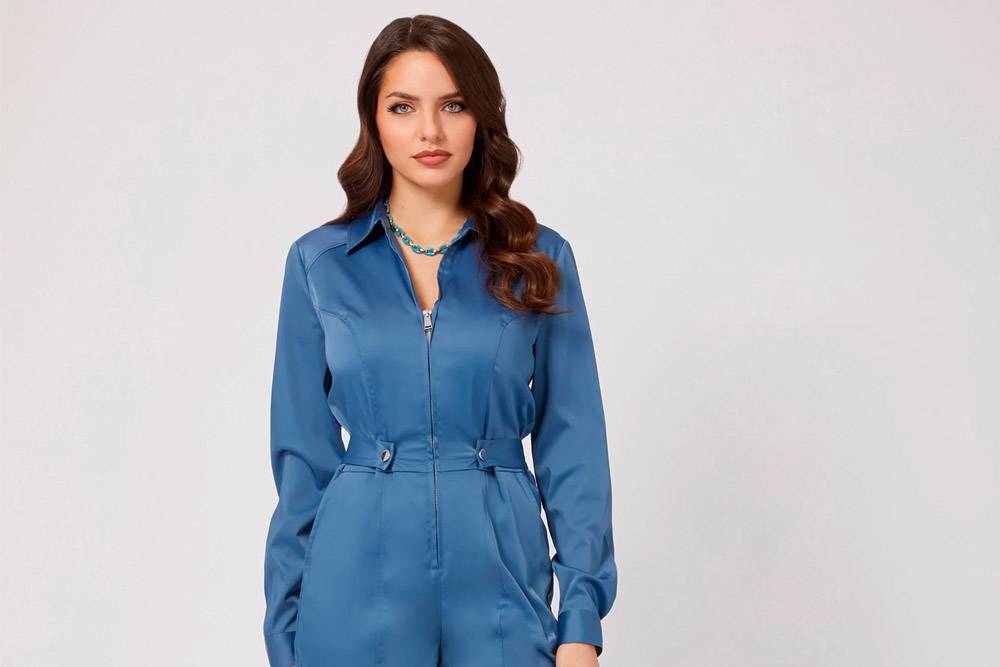
Guess is an American fashion retailer founded in 1981 in Los Angeles by Paul, Georges, Maurice, and Armand Marciano. The multinational clothing-retail company creates fast fashion for men, women, and children.
Guess makes clothing, accessories, shoes, swimwear, beauty, and perfumes. It operates more than 1,000 stores and has 15,000 employees in stores, factories, logistics, brands, and subsidiaries across 100 countries where it does business.
Guess is integrating sustainability at the core of its business with integrity, people empowerment, and environmental protection. It creates growth opportunities for its associates and suppliers.
VISION GUESS is its sustainability plan for the coming years that integrates sustainability within its operations and value chain, promotes diversity and inclusion.
Guess is a fashion brand and clothing retailer based in Los Angeles, California, United States. It makes apparel, footwear, and accessories and offers a collection of basics, activewear, underwear, loungewear, swimwear, outerwear, bags, and accessories.
Panaprium is independent and reader supported. If you buy something through our link, we may earn a commission. If you can, please support us on a monthly basis. It takes less than a minute to set up, and you will be making a big impact every single month. Thank you!
Sustainability Rating: 5/10
Rating FAQ
Category: Clothing, accessories, shoes, bags, jewelry
For: Women, men, children
Type: Basics, denim, knitwear, activewear, underwear, loungewear, swimwear, outerwear, sneakers, boots, heels, sandals, flats
Style: Casual
Quality: Low
Price: $
Sizes: XS-XL, 2-10 (US), 4-12 (UK), 34-40 (EU), 4-12 (AU)
Fabrics: Cotton, linen, ramie, lyocell, modal, viscose, acetate, polyester, nylon, spandex, acrylic, neoprene, polyurethane, rubber, leather, wool, silk, down
100% Organic: No
100% Vegan: No
Ethical & Fair: Yes
Recycling: Yes
Producing countries: Bangladesh, Cambodia, China, India, Indonesia, Mexico, Pakistan, Sri Lanka, Tunisia, Turkey, Vietnam
Certifications: GOTS, OCS, GRS, RCS, FSC, PEFC, BCI, RDS, Sedex, WRAP SA8000
Sustainability Practices
Guess takes wide-ranging measures to create fashion that contributes to a climate positive, circular economy. It has ambitious commitments and goals to make bold changes in sustainability.
It wants to be more sustainable and waste less, reimagining fashion. However, the majority of its business remains detrimental to the environment.
Guess only uses a tiny proportion of organic materials such as organic cotton, or recycled materials such as recycled cotton, recycled polyester, and regenerated nylon.
Most of the fabrics it uses are natural without relevant certifications, such as regular cotton or linen, or synthetic petroleum-based fibers such as polyester, nylon, acrylic, and more.
Guess also uses a small amount of semi-synthetic fibers or regenerated cellulosic fabrics such as Tencel lyocell, modal, acetate, and viscose.
Tencel is an eco-friendly fiber made with wood pulp from certified sustainable forests. But only a minuscule proportion of the materials used by Guess are environmentally friendly and sustainable.
Guess publishes a list of all its manufacturers and processing facilities on its corporate website. It believes in justice, equality, and community and prioritizes critical topics like diversity and inclusion and deeper partnerships with suppliers.
The 2021 Fashion Transparency Index gave Guess a score of only 12% based on how much the group discloses about its social and environmental policies, practices, and impacts.
Guess manufactures its clothes in Turkey and many other East Asian countries where human rights and labor law violations still happen every day.
The American clothing retailer shows labor certification standards that ensure good working conditions, health, safety, and other human rights for workers in its supply chain.
Guess has a code of conduct that applies to all its suppliers and subcontractors based on the regulations set by the International Labor Organization (ILO).
Guess assesses compliance with its Code of Conduct by informal visits or third-party audits with or without notice. It works with international NGOs to improve the working conditions in its factories.
Guess doesn't use any exotic animal skin, hair, fur, or angora. But it uses leather, wool, silk, and down feathers to manufacture many of its clothing pieces.
These animal-derived materials are cruel and unethical. They also harm the environment by producing greenhouse gases and waste. More sustainable alternatives exist.
Sustainability Goals
Guess has committed to reducing its environmental impact across the entire supply chain. It introduces new product designs and ideas around production and commerce.
Guess also prioritizes gender parity and increases ethnic diversity in executive leadership positions. It wants to keep increasing transparency and maintaining the highest standards.
Guess will establish a training program for 100% factory owners in key regions by 2024. It will partner with key vendors on disclosures and programs that will lead to positive change for women in 2022.
30% of its global materials portfolio will be more sustainable by 2023. 100% of the polyester it uses will be recycled or bio-based in 2024 for mainline and in 2029 for all brands.
Guess plans to reduce its GHG emissions by 50% in its Scope 1 and 2 and 30% in its scope 3 (supply chain) by 2030. It aims to have 100% of all packaging materials be recycled or recyclable in 2025.
Buy Here
Discover Guess's sustainable collections at Guess.com.
Was this article helpful to you? Please tell us what you liked or didn't like in the comments below.
About the Author: Alex Assoune
What We're Up Against
Multinational corporations overproducing cheap products in the poorest countries.
Huge factories with sweatshop-like conditions underpaying workers.
Media conglomerates promoting unethical, unsustainable products.
Bad actors encouraging overconsumption through oblivious behavior.
- - - -
Thankfully, we've got our supporters, including you.
Panaprium is funded by readers like you who want to join us in our mission to make the world entirely sustainable.
If you can, please support us on a monthly basis. It takes less than a minute to set up, and you will be making a big impact every single month. Thank you.































0 comments